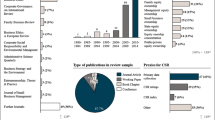Abstract
This article presents the results of a study that analysed whether social responsibility had any bearing on the decision making of institutional investors. Being that institutional investors prefer socially aligned organizations, this study explored to what extent the corporate actions and/or social/environmental investments influenced their decisions. Our results suggest that there are specific variables that affect the perceived value of the organization, leading to decisions to not only invest, but whether to hold or sell the shares, and therefore having a consequential impact on the capital market’s valuation.
Similar content being viewed by others
References
Alreck, A. L. and R. B. Settle: 1985, The Survey Research Handbook (Richard D. Irwin Inc., Illinois).
Belkaoui, A.: 1976, The Impact of the Disclosure of the Environmental Effects of Organizational Behavior on the Market, Accounting, Organizations and Society, 5(3), 263. doi:10.1016/0361-3682(80)90001-X.
Bradford, D. P.: 2001, ‘Successful Online Qualitative Market Research’, Quirks Marketing Research Review, www.quirks.com
Clarkson, M.: 1995, A stakeholder Framework for Analyzing and Evaluating Corporate Social Performance, Academy of Management Review, 20(1), 92–117. doi:10.2307/258888.
Cox, P., Brammer, S. and A. Millington: 2004, An Empirical Examination of Institutional Investor Preferences for Corporate Social Performance, Journal of Business Ethics, 00 , 1–17.
Demos, T.: 2006, Beyond the Bottom Line: Our Second Annual Ranking of Global 500 Companies. Fortune October, 23
Fama, E. F.: 1991, Efficient Capital Markets: II, The Journal of Finance, 46(5), 1575–1617. doi:10.2307/2328565.
Frooman, J.: 1997, Socially Irresponsible and Illegal Behavior and Shareholder Wealth: A Meta Analysis of Event Studies, Business & Society, 36(3), 221–249. doi:10.1177/000765039703600302.
Gilley, K. M., Worrell, D. L., Davidson, W. N., III and A. El-Jelley: 2000, Corporate Environmental Initiatives and Anticipated Firm Performance: The Differential Effects of Process-Driven Versus Product-Driven Greening Initiatives, Journal of Management, 26(6), 1199. doi:10.1177/014920630002600607.
Glaser, B. G. and A. L. Strauss: 1967, The Discovery of Grounded Theory: Strategies for Qualitative Research (Aldine-Atherton, Chicago).
Graves, S. B. and S. A. Waddock: 1994, ‘Institutional Owners and Corporate Social Performance’, Academy of Management Executive 37(4):1034-1046
Griffin, J. J. and J. F. Mahon: 1997, The Corporate Social Performance and Corporate Financial Performance Debate: Twenty-five years of incomparable research, Business & Society, 36(1), 5–31. doi:10.1177/000765039703600102.
Hamilton, S., Jo, H. and M. Statman: 1993, Doing Well While Doing Good. The Performance of Socially Responsible Mutual Funds, Financial Analysts Journal, 49(6), 62–67. doi:10.2469/faj.v49.n6.62.
Hillman, A. and G. Keim: 2001, Shareholder value, stakeholder management, and social issues: what’s the bottom line? Strategic Management Journal, 22(2), 125–139. doi:10.1002/1097-0266(200101)22:2<125::AID-SMJ150>3.0.CO;2-H.
Jones, K. and P. H. Rubin: 2001, ‘Effects of Harmful Environmental Events on Reputations of Firms’, Working Paper, Kari Jones, Department of Economics, Emory University, Atlanta, GA 30322-2240, email: kjoneolgemory.edu; Paul H. Rubin, Department of Economics, Emory University, Atlanta, GA 30322-2240, email: prubingemory.edu
Jones, R. and A. J. Murrel: 2001, Signaling Positive Corporate Social Performance, Business & Society, 40(1), 59–78. doi:10.1177/000765030104000105.
Knight, R. F. and D. J. Pretty: 1996, The Impact of Catastrophes on Shareholder Value, Risk Management, 45(5), 39–41.
Knight, R. F. and D. J. Pretty: 1998, ‘Value at Risk: The Effects of Catastrophes on Share Price’, Risk Management May, 39–41
Kroll, K. M.: 2001, ‘Good Deeds Deliver: Socially Responsible Investing Reaps Ethical and Financial Rewards’, Global Manufacturing Portfolio January 15
Mitchell, R., Agle, B. and D. J. Wood: 1997, Toward a theory of stakeholder identification and salience: Defining the principle of who and what really counts, American Management Review, 22(4), 853–886.
Morgan, M. G., Fischhoff, B., Bostrom, A. and C. J. Atman: 2002, Risk Communication: A Mental Models Approach (Cambridge University Press, New York).
Orlitzky, M., Schmidt, F. L. and S. L. Rynes: 2003, Corporate Social and Financial Performance: A Meta-Analysis, Organization Studies, 24(3), 403–441. doi:10.1177/0170840603024003910.
Palmer, T. B. and G. M. Pickett: 1999, The role of mental models in control theory: Understanding cognitive factors, Journal of Marketing Theory and Practice, 7(1), 17–29.
Porter, M. E. and M. R. Kramer: 2006, Strategy & Society: The Link Between Competitive Advantage and Corporate Social Responsibility, Harvard Business Review, 84(12), 78–92.
Preston, L. E. and D. P. O’Bannon: 1997, The Corporate Social-Financial Performance Relationship, Business & Society, 36(4), 419. doi:10.1177/000765039703600406.
Rao, H. and K. Sivakumar: 1999, Institutional Sources of Boundary Spanning Structures: The Establishment of Investor Relations Departments in the Fortune 500 Industrials, Organization Science, 10(1), 27. doi:10.1287/orsc.10.1.27.
Ray, N. M. and S. W. Tabor: 2003, Cybersurveys come of age, Marketing Research, 15(1), 32.
Schaltegger, S. and F. Figge: 1998, Environmental Shareholder Value, vol. 40 (Wirtchsaftswissenschaftliches Zentrum der Universitat Basel, Basel)
Stake, R. E.: 2000, Case Studies, in N. K. Denzin and Y. S. Lincoln (eds.), Handbook of Qualitative Research, 2nd Edition (Sage Publications, Thousand oaks).
Turner, S. F.: 1999, Building organizational capabilities in the Canadian energy sector, Academy of Management Executive, 13(2), 88–89.
Waddock, S., & Graves, S. (1997). The corporate social performance-financial performance link. Strategic Management Journal, 18(4), 303–319. doi:10.1002/(SICI)1097-0266(199704)18:4<303::AID-SMJ869>3.0.CO;2-G.
Walley, N. and B. Whitehead: 1994, ‘It’s Not Easy Being Green’, Harvard Business Review 72:46–52
Weigand, E. M., Brown, K. R. and, E. M. Wilhem: 1996, Socially Principled Investing: Caring About Ethics and Profitability, Trusts and Estates, 135(9), 36–42.
Westphal, J. D. and E. J. Zajac: 1998, The Symbolic Management of Stockholders: Corporate Governance Reforms and Shareholder Reactions, Administrative Science Quarterly, 43(1), 127–153. doi:10.2307/2393593.
Wilmshurst, T. D. and G. R. Frost: 2001, The Role of Accounting and the Accountant in the Environmental Management System, Business Strategy and the Environment, 10(3), 135. doi:10.1002/bse.283.
Wood, D. J.: 1991a, Corporate Social Performance Revisited, Academy of Management Review, 16(4), 691–718. doi:10.2307/258977.
Yin. R. K.: 1993, Applications of Case Study Research (Sage Publications, Thousand Oaks, California).
Yin, R. K.: 1998, The Abridged Version of Case Study Research, in L. Bickman and D. J. Rog (eds.), Handbook of Applied Social Research Methods (Sage Publications, Thousand Oaks, California).
Author information
Authors and Affiliations
Corresponding author
Rights and permissions
About this article
Cite this article
Petersen, H.L., Vredenburg, H. Morals or Economics? Institutional Investor Preferences for Corporate Social Responsibility. J Bus Ethics 90, 1–14 (2009). https://doi.org/10.1007/s10551-009-0030-3
Received:
Accepted:
Published:
Issue Date:
DOI: https://doi.org/10.1007/s10551-009-0030-3




